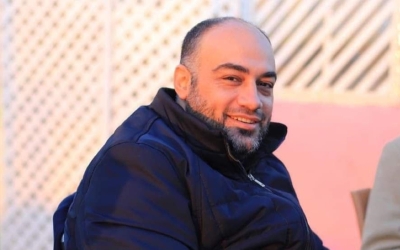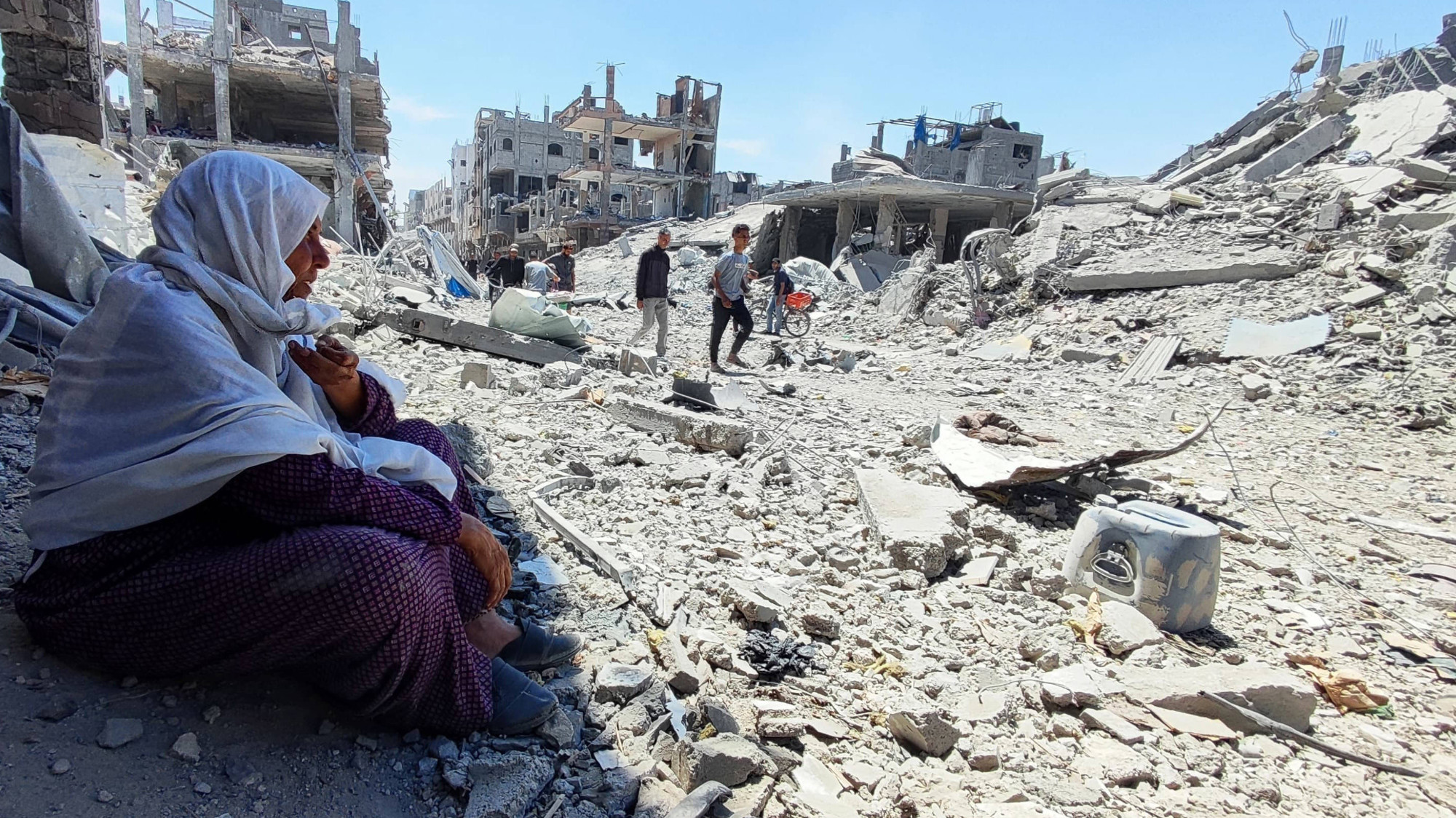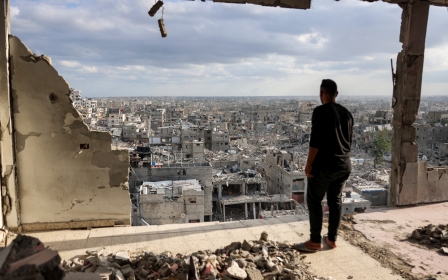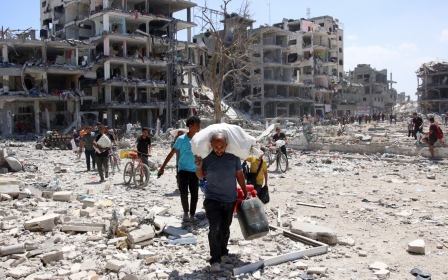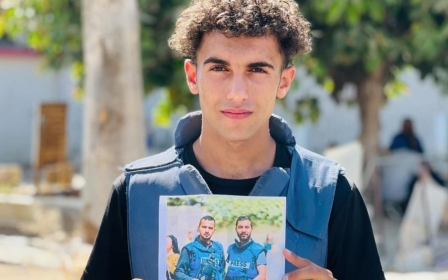Gaza: The story of a disabled Palestinian woman burnt alive by an Israeli soldier
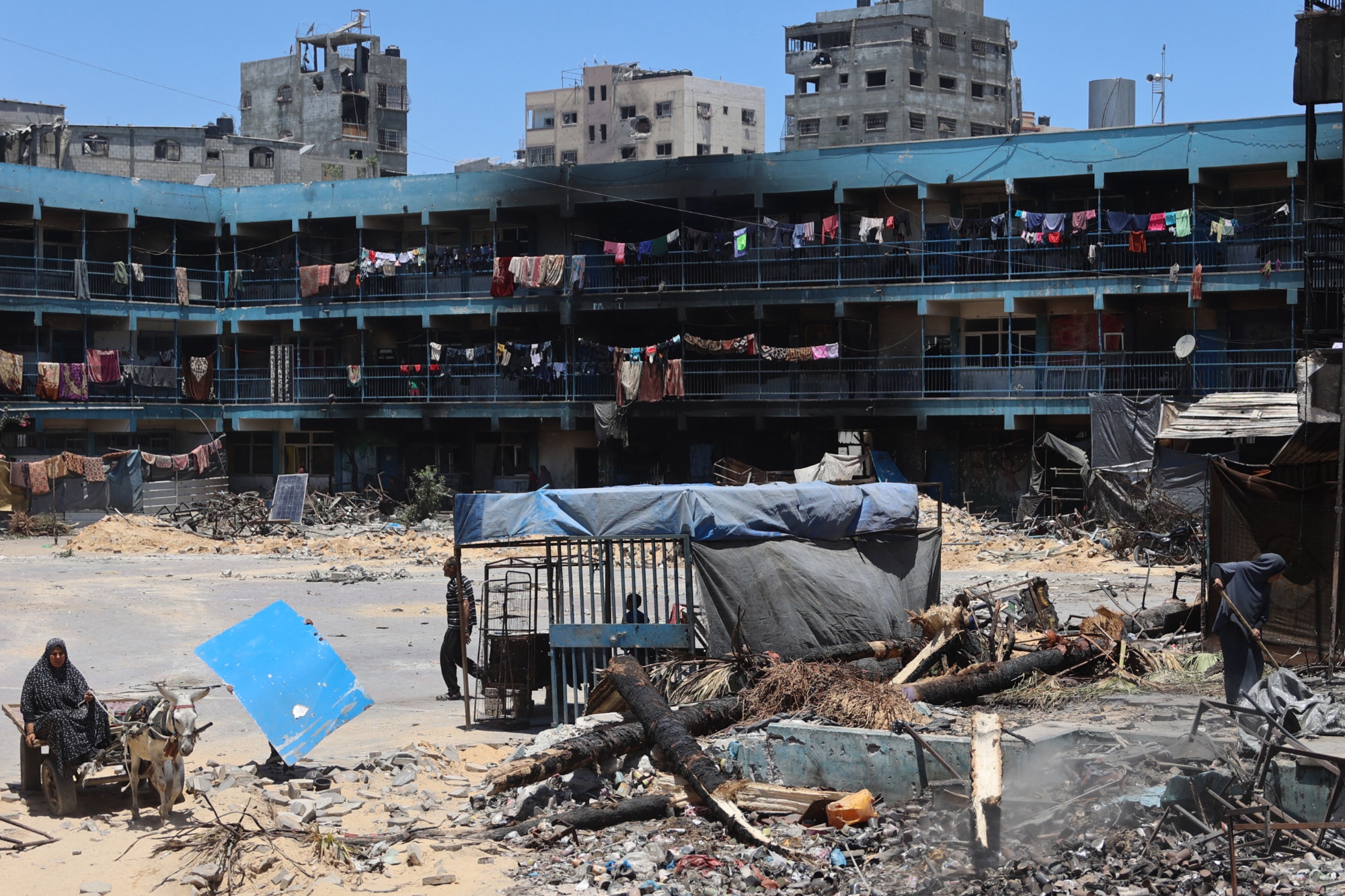
Muhammed Ismail al-Hweihi froze when he saw an Israeli soldier setting ablaze a makeshift tent with his daughter inside.
Duaa, a disabled 34-year-old, had been separated from her father, her sole carer, only a few minutes earlier.
Hweihi was forced to hastily flee the tent the family set up in the courtyard of a school-turned-shelter in northern Gaza’s Jabalia refugee camp.
This was because Israeli troops had suddenly begun to fire live bullets inside the school ahead of storming it during a devastating three-week assault on the camp in May.
Duaa, who was unable to speak or move, was left behind inside the tent because her father couldn’t carry her.
New MEE newsletter: Jerusalem Dispatch
Sign up to get the latest insights and analysis on Israel-Palestine, alongside Turkey Unpacked and other MEE newsletters
After the soldiers entered the school under the cover of heavy fire, men and women were separated.
Moments later, a soldier poured gasoline on dozens of tents in courtyards before setting them on fire.
His voice drowned out by the hammering blast of tanks and heavy gunfire, Hweihi stood watching silently and hopelessly.
“She was burnt alive while we couldn't move,” he said.
“I felt my heart and brain burning.”
Moving from shelter to shelter
The killing of Duaa inside her tent happened in mid-May, according to Hweihi.
The Palestinian father had been forced to move with her from one shelter into another for months before her death, amid the relentless Israeli bombardment.
Duaa was born a normal child, he told Middle East Eye, but over time, her body weakened.
The doctors told him she had cerebral palsy, and her muscles grew weaker as time went on until she lost her ability to move or communicate.
'She was burnt alive while we couldn't move...I felt my heart and brain burning'
- Muhammed Ismail al-Hweihi, Palestinian father
Since the death of his wife eight years ago, Duaa had become dependent on Hweihi for everything.
“She couldn’t move or speak and depended on me for everything - feeding, giving her water, and caring for her,” he told MEE.
“It was like caring for an infant for 34 years.”
Like hundreds of thousands of Palestinians across Gaza, Hweihi was displaced multiple times over the past year due to ongoing Israeli raids and aerial bombings.
Each time, he had to carry Duaa with him despite his advanced age.
“We were displaced several times and Duaa was with me, along with one of my sons, his wife, and their children,” he said.
The first time he received messages on his phone from the Israeli military, telling him to leave Jabalia to a “safe place”.
The first shelter was a school in the Jabalia refugee camp, but he soon found out schools were not off limits to Israeli bombardment and stormings.
“The school wasn’t safe, they bombed everything there, stormed it, filmed us, interrogated us, detained some people, and then expelled us from there,” Hweihi recalled.
Eventually, he moved to an Unrwa-run school complex called Abu Zeitoun.
“There was also constant shelling around us [there],” he said.
“Every day, something new happened; every day they bombed a new and nearby place or fired shots from quadcopters or invaded the surrounding area. We lived some of the hardest days of our lives there.”
Since the beginning of Israel’s war on Gaza on 7 October 2023, the Israeli military has targeted and stormed dozens of schools, including those run by the UN, which have served as shelters for families forced out of their homes by Israeli forces or for those whose homes were destroyed in the attacks.
Other schools were turned into bases for Israeli military operations after they were raided and cleared of displaced families.
Due to limited space in the remaining schools, many people, like Hweihi and his family, were forced to set up tents in the playgrounds or just outside.
The Hweihi's tent was made from nylon with a zinc roof in the schoolyard, he said.
“We couldn’t find a place in the school’s classrooms, where thousands of other residents of Jabalia were staying after their homes were bombed. Some even came to the schools thinking they would be safer than their homes and neighbourhoods, which were relentlessly bombarded,” Hweihi added.
“We stayed there for nearly four months, and throughout that time, we were starved and had to eat animal food. The attacks didn’t stop, and only God knows what we endured there.”
‘We watched as the flames engulfed it’
In early May, Israel launched its second ground assault on Jabalia, located north of Gaza City, since the start of the war in October 2023.
For 20 days, bombs rained down relentlessly on the densely populated refugee camp as tanks and troops advanced on the ground and laid siege to it.
The intensity of the attacks kept creeping closer and closer to Abu Zeitoun schools, with shrapnel and gunfire intermittently reaching the school’s premises.
But the morning of 15 May brought “another level of horror,” according to Hweihi.
'A soldier... went to the tents, poured gasoline on the wood and nylon and then set them on fire. He ignited the tent where my daughter Duaa was lying'
- Muhammed Ismail al-Hweihi
“At around 8 or 9 am, we were sitting together and I was feeding Duaa barley bread,” he recalled.
“Suddenly, out of nowhere, the shooting started. An Israeli sniper fired into the schoolyard, killing a 24-year-old woman, then a young man from the Khalidi family was shot next. We ran as fast as we could, trying to get away from the sniper fire, and took shelter in one of the classrooms.
“I couldn’t bring Duaa with me. I couldn’t carry her as I was running, I had no way to lift her.”
Israeli forces soon stormed the school under heavy gunfire, separating men from women, interrogating individuals, and detaining some young men from the school.
“There was a soldier among them dressed in civilian clothes who went to the tents, poured gasoline on the wood and nylon and then set them on fire. He ignited the tent where my daughter Duaa was lying.
“We all watched as the flames engulfed it, and tanks and soldiers fired everywhere. I couldn't scream; there was no one to talk to. Who could I talk to? The tanks that didn't stop firing?”
The soldiers then continued to destroy the remaining tents and structures in the school.
“After the fire, they bulldozed the rest of the tents, even the walls. It all became one pile of rubble, and then they expelled us from the school,” Hweihi said.
For around 10 days, he was unable to return to the school. When he finally did, it was to search for his daughter’s remains.
“I went back, but nothing was left of her,” he said.
“Not a single trace of her body. I searched through the rubble, but Duaa was gone.”
During the assault on Jabalia, Israeli forces “damaged almost everything,” residents, survivors and local reporters said after the army withdrew in late May.
Entire neighbourhoods were wiped out, most homes were gone; basic infrastructure - like water wells, the main sewage pump, utility poles and telephone lines - were destroyed. The central open market was flattened, two hospitals were raided by Israeli troops, a vital UN clinic serving thousands of people was torched, and a street housing several schools was completely wrecked.
Witnesses said the Jabalia refugee camp was left “unrecognisable” and was no longer suitable for human habitation.
Jabalia is the largest of eight refugee camps in the Gaza Strip. Before the war, it housed over 116,000 people officially registered with Unrwa. The actual number of people in the camp is likely to be much higher.
Palestinian refugee camps like Jabalia's were established in 1948 to temporarily house families expelled from their homeland by Zionist militias in the war that created Israel, in an event known to Palestinians as the Nakba - or "catastrophe" in English.
With an area of 1.4 sq km, Jabalia is one of the most densely populated Unrwa camps.
Earlier this week, Israeli forces launched another ground and aerial assault on the camp, bombing it relentlessly once again, and forcing tens of thousands of people out of their homes and shelters.
Middle East Eye delivers independent and unrivalled coverage and analysis of the Middle East, North Africa and beyond. To learn more about republishing this content and the associated fees, please fill out this form. More about MEE can be found here.


